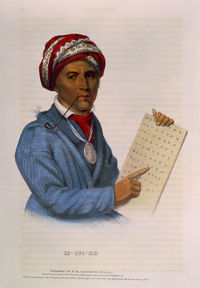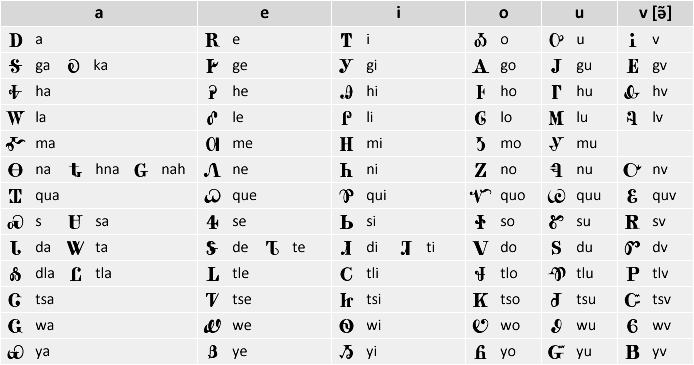Cherokee
The Cherokee,
or
 (ah-ni-yv-wi-ya) in the
Cherokee language, are a people native to
North America, who at the time of European contact in the
16th century, inhabited what is now the
Eastern United States and
Southeastern United States until most were forcefully moved to the
Ozark
Plateau. They were one of the tribes referred to as the
Five Civilized Tribes.
(ah-ni-yv-wi-ya) in the
Cherokee language, are a people native to
North America, who at the time of European contact in the
16th century, inhabited what is now the
Eastern United States and
Southeastern United States until most were forcefully moved to the
Ozark
Plateau. They were one of the tribes referred to as the
Five Civilized Tribes.
Contents
Nations and Bands recognized by the United States
government, and representing 250,000
Federally recognized Cherokees, have headquarters in
Tahlequah, Oklahoma (the
Cherokee Nation, and
United Keetoowah Band of Cherokee Indians and at
Cherokee, North Carolina (Eastern
Band of Cherokee Indians). State-recognized Cherokee tribes have
headquarters in
Georgia,
Missouri and
Alabama.
Other large and small non-recognized Cherokee organizations are located
in
Arkansas,
Missouri,
Tennessee, and other locations in the United States.
A
1984 KJRH-TV
documentary, "Spirit of the Fire" explored the history of the
Keetoowah Nighthawk Society, and their preservation of the
traditional ceremonies and rituals practiced and maintained by the
Cherokee after their arrival in Oklahoma. Redbird Smith was an
influential Nighthawk member and the group revitalized traditional
spirituality among Cherokees, beginning in the early
20th century. Today there are seven ceremonial dance grounds in
Oklahoma and these either belong to the Keetoowah tradition or the Four
Mothers Society.
The spelling "Cherokee" was once believed to be due to
the Cherokee language's name, "Tsalagi" (ᏣᎳᎩ) - this then may have been
rendered phonetically in Portuguese (or more likely a barranquenho
dialect, since
de Soto was
Extremaduran) as chalaque, then in French as cheraqui,
and then by the English as cherokee.
The Cherokee language does not contain any "r" based
sounds, and as such, the word "Cherokee" when spoken in the language is
expressed as Tsa-la-gi (pronounced Jah-la-gee or Cha-la-gee) by native
speakers, since these sounds most closely resemble "Cherokee" in the
native language. A Southern Cherokee group did speak a local dialect
with a trilled "r" sound after early contact with Europeans of both
French and Spanish ancestry in Georgia and Alabama during the early
1700s. The ancient
Ah-ni-ku-ta-ni dialect and Oklahoma dialects do not contain any 'r'
based sounds.
The word "Cherokee" is a derived word which came
originally from the
Choctaw
trade language. It was derived from the Choctaw word "Cha-la-kee" which
means "those who live in the mountains" or "those who live in the
caves." The name which the Cherokees originally used for themselves is
Ah-ni-yv-wi-ya (literal translation "these are all the human
people"). Most native American tribes have a name for themselves which
means approximately this. However, modern Cherokee call themselves
Cherokee, or Tsalagi.
-
 The
Cherokee speak an
Iroquoian language which is
polysynthetic and is written in a
syllabary invented by
Sequoyah. It is now believed that a more ancient Syllabary that
predated Sequoyah and may have inspired his great work for the
Cherokee people was handed down through the
Ani Kutani, an ancient priesthood of the Cherokee people. The
Cherokee speak an
Iroquoian language which is
polysynthetic and is written in a
syllabary invented by
Sequoyah. It is now believed that a more ancient Syllabary that
predated Sequoyah and may have inspired his great work for the
Cherokee people was handed down through the
Ani Kutani, an ancient priesthood of the Cherokee people.
For years, many people wrote transliterated Cherokee
on the Internet or used poorly intercompatible fonts to type out the
syllabary. However, since the fairly recent addition of the Cherokee
syllables to
Unicode, the Cherokee language is experiencing a renaissance in
its use on the Internet. It should be noted, however, that as of
June 2006 the Cherokee Nation of Oklahoma still officially uses a
non-unicode font for online documents, including online editions of
the
Cherokee Phoenix.

continued...
Other History links |







